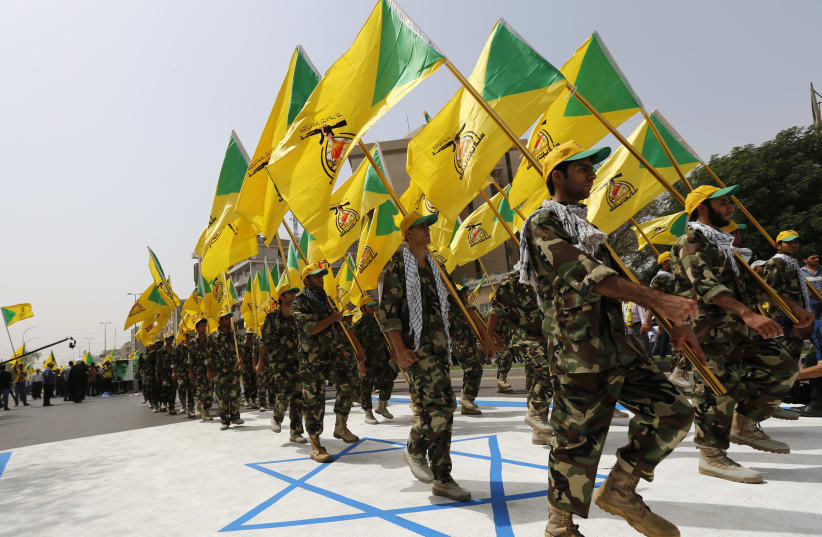ARTICLE AD BOX
A report this week indicates that some of these militias and groups have stepped back from attacks in the wake of the Israel-Lebanon ceasefire.
By SETH J. FRANTZMAN DECEMBER 23, 2024 16:05 Iraqi Shi'ite Muslim men from the Iranian-backed group Kataib Hezbollah wave the party's flags as they walk along a street painted in the colours of the Israeli flag during a parade marking the annual Quds Day, or Jerusalem Day, on the last Friday of the Muslim holy month of Ramadan, in Baghdad
(photo credit: THAIER AL-SUDANI/REUTERS)
Iraqi Shi'ite Muslim men from the Iranian-backed group Kataib Hezbollah wave the party's flags as they walk along a street painted in the colours of the Israeli flag during a parade marking the annual Quds Day, or Jerusalem Day, on the last Friday of the Muslim holy month of Ramadan, in Baghdad
(photo credit: THAIER AL-SUDANI/REUTERS)
Iranian-backed militias in Iraq have been attacking Israel for a year, in the wake of the Hamas attack on October 7, 2023. They began their attacks almost immediately after the Hamas attack, first targeting US forces in Syria and Iraq and then expanding the attacks to strike at Israel.
These groups call themselves the Islamic Resistance in Iraq, but they are made up of a number of militias and groups. They usually used drones to target Israel, because Iraq does not share a land border with Israel.
A report this week indicates that some of these groups have stepped back from attacks in the wake of the Israel-Lebanon ceasefire. That ceasefire ended Hezbollah’s attacks on Israel.
A report today at Al-Akhbar media in Lebanon, which is generally seen as pro-Hezbollah, has indicated that some of the Iraqi groups have agreed to stop attacks on Israel. Harakat Hezbollah al-Nujaba said that it had agreed with Iraqi Prime Minister Shia al-Sudani to stop its offensive operations against Israel.
The spokesman for the one of the groups, the Sayyed al-Shuhada Brigades, also discussed this issue. Kazem al-Fartousi, the spokesperson, was quoted in the same report as saying that “circumstances determine the positions of the factions, and the principle of unity of arenas is not linked to a temporary alliance between the factions of the axis of resistance, but rather it is a matter of principle and doctrine, and whatever the losses, the Iraqi factions have not and will not abandon the principle of unity of arenas.”
Axis of resistance
This statement includes a number of terms and key words that reflect what the Iranian-backed militias are thinking. “Axis of resistance” refers to Iran and pro-Iran groups such as Hezbollah, Palestinian Islamic Jihad, the Houthis and militias in Iraq. When he speaks about “unity of the arenas” this is the term for Iran coordinating with all these groups to attack Israel.
This was put into place several years ago and after October 7 Iran operationalized this multi-front war on Israel. He is saying that new circumstances may mean a temporary end of attacks. Nevertheless, the groups won’t stop the attacks.
The spokesperson said that “operations against Israel were linked to the operations of the Lebanese Hezbollah, and when the ceasefire was reached in Lebanon, the operations of the Iraqi factions stopped, and there are also partners in Iraq who have an opinion and reservations about those operations, and they must be listened to.” Now the groups are “studying” what to do next.
Nujaba, which is one of the key pro-Iran groups in Iraq, has said that it has agreed to stop operations for now against Israel. It was not clear that Nujaba was the main group doing the drone attacks, so this “stopping” may not mean much. Nevertheless it is clear that the pro-Iran militias and the Iraqi government is more concerned at the moment with Syria. It appears there are increasing calls for the militias to be disbanded in Iraq and hand over their arms to the government. Baghdad doesn’t want to provoke a rebellion as happened in Syria.
The Sunnis in Iraq resent the role of the Shi’ite pro-Iran militias. They may see the fall of Assad as an opportunity. "The Islamic Republic of Iran gave us the freedom to decide regarding the Syrian scene and the control of the terrorist groups called Hay'at Tahrir al-Sham," the Nujaba source told Akhbar media. He also said that the US and Israel want the various militias in Iraq disbanded. They are very worried about how Syria could impact this.
Stay updated with the latest news!
Subscribe to The Jerusalem Post Newsletter
The Iraqi-based militias come under the umbrella of the Popular Mobilization Units or Forces in Iraq. This group was created in 2014 to fight ISIS. It includes dozens of brigades. The group had up to 100,000 men under arms during the ISIS war. It includes the Badr militias, as well as Kataib Hezbollah, Nujaba, Asaib Ahl al-Haq and many other groups.
After 2018 the PMU became an official paramilitary force with a state budget. Many of the group are linked to the Interior Ministry in Iraq. However, they also became involved in attacks on US forces in Iraq and Syria. In January 2020 the US killed IRGC Quds Force head Qasem Soleimani in Baghdad and also killed Abu Mahdi al-Muhandis, the head of Kataib Hezbollah.
The US was putting the militias on notice. But they didn’t stop attacks on US forces. In fact in January 2024 Kataib Hezbollah killed three Americans in Jordan in a drone attack. Now it appears these groups have toned down their threats and attacks, at least temporarily.

 3 days ago
16
3 days ago
16








 English (US) ·
English (US) ·